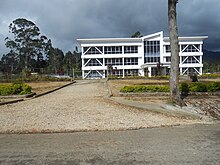Mendi is the capital of the Southern Highlands province in the Highlands region of Papua New Guinea. Mendi is also little town in Ethiopia, Oromia regional state in Western Wollegga district.
Understand
[edit]
Mendi was known as "Murumbu" during the colonial era in the 1950s but gradually got its current name after independence. Mendi is at an altitude of 1,675 m and lies in the Mendi River valley on a gentle volcanic slope. The population in Mendi for 2021 is 56 108. Mendi is the third largest of Papua New Guinea's 41 cities. Mendi's residents live in clans with long-standing relationships with people living elsewhere (Kandep, Ialibu, Tambul, Lai valley and Kagua).
The valley is flanked to the north-east by Mount Giluwe, PNG’s second highest mountain and to the west by limestone peaks that separate it from the Lai Valley. In addition to the town and the river, “Mendi” also refers to the people who live in the surrounding areas. There are two rivers that flow through Mendi named as River Mendi and Magani River which collectively combine and flows southerly to meet River Lai and on towards Purari River in the Gulf Province. Temperatures in the area range from 7° to 24° C, with high-altitude areas regularly experiencing crop-damaging frosts. Vegetables and coffee are the main crops.
In 2000 the town suffered major inter-tribal violence, when around 50 people were killed. Although it has been relatively quiet since then, tour organizers tend to shun it and the neighbouring township of Tari. This is very much a location for the independent, adventurous traveller.
Get in
[edit]- Air Niugini connects PNG's capital Port Moresby just once a week with Mendi.
Mendi is on the southern spur of the Highlands Highway. It can be reached by road from Lae, Goroka, Mt. Hagen, Madang and Tari.
Get around
[edit]See
[edit]Do
[edit]Buy
[edit]Eat
[edit]Drink
[edit]Sleep
[edit]- Kiburu Lodge, PO Box 466, Mendi (a few miles south of Mendi on the Highlands Highway), ☏ +675 549 1077, fax: +675 549 1350, kiburu@datec.com.pg. Located on the banks of the Mendi River, this is a comfortable village-owned hotel. Twelve units with river views, television, telephone and refrigerator. Eight budget rooms with shared bathrooms. The lodge has been renovated. Birdwatching and whitewater rafting can be arranged. Expensive.
- Mendi Travellers Inn, Section 11, Allotment 8, Old Compound Road. Mendi Travellers Inn is an International Standard Hotel in the heart of Mendi Town with direct access to the CBD, public transport, supermarkets, shopping centres and tourism outlets.
- 1 Gliuwe ecoTour Lodge, Mangani,Mendi 315,SHP,Papua New Guinea (Beside Mangani River and Mendi-Kandep Highway), ☏ +675 7296 0712. Check-in: 7AM, check-out: 10AM. This lodge is beside the Mangani River and is a group of bungalows which line the river. You can get a best view of the river there of everyday life of people there.
Connect
[edit]Go next
[edit]- Lake Kutubu. Although at 800 m above sea level, this is considered to be in the lowlands of the Southern Highlands province. Southwest of Mendi, the culture is similar to that of the lower lying Western Province of PNG as men and women live in segregated houses. Considered to be one of the most beautiful spots in PNG, despite the presence of Chevron who are pumping oil into a pipeline down to the south coast. You can canoe around the lake to visit the villages and swim in the lake. The lake has considerable biodiversity and ecological significance, with ten of its 14 fish found only there. Reachable from Mendi by road but also, because of the oil extraction, directly from Port Moresby to Moro Airport on PNG Air.
- Tari. As a town Tari has little to offer. But it is close to the land of the Huli Wigmen, is one of the few reachable places where people still wear traditional costumes, and also offers excellent birdwatching. It is about 75 miles west of Mendi by road and has weekly flights from Port Moresby on Air Niugini. The Huli have a very traditional culture. Young men go into the jungle alone for months to develop the skills that will earn them respect. During this period they grow their hair long in preparation for making their first wig. Special events cause Huli wigmen to spend hours preparing their costumes and make-up, complete with wigs. Local accommodation, including the Ambua Lodge, is very expensive.
